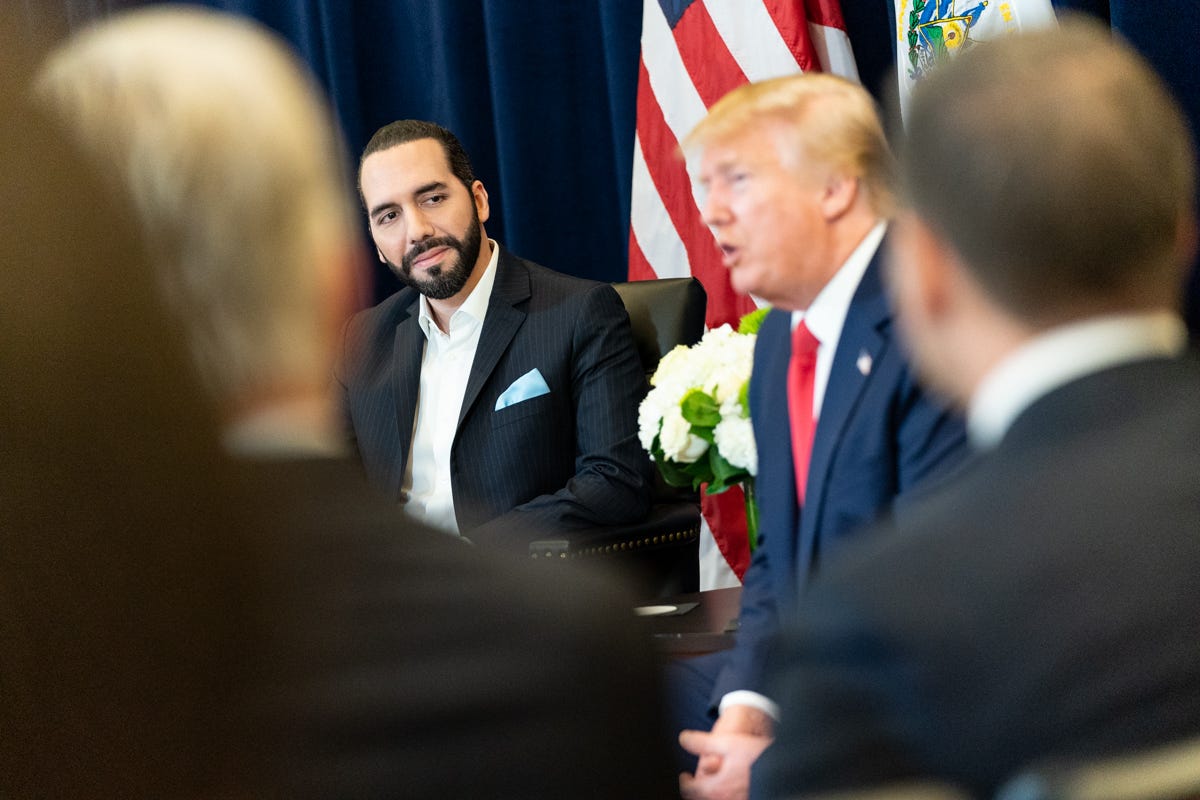The $1.5 Million Lobbying Blitz Behind the Self-Described “Dictator” Visiting Trump’s White House
Justice Department records reveal how a multimillion-dollar foreign lobbying campaign helped Bukele secure rare access to Trump’s inner circle.

Today’s White House meeting between President Donald Trump and El Salvador’s Nayib Bukele isn’t just another international handshake — it’s the capstone of a multi-million-dollar foreign lobbying blitz aimed at building deep ties with Trumpworld and reshaping U.S. policy toward El Salvador. This meeting was years in the making—and it didn’t come cheap.
Bukele has attracted criticism from a range of civil society organizations and rights groups over claims of various abuses, extrajudicial killings, and the alleged detainment of thousands of people without due process as part of a sweeping anti-gang crackdown.
Bukele denies the mounting human rights abuse allegations, and he has gotten a boost from individuals in Trump’s inner circle.1
So how did the self-described "world's coolest dictator” win over so many in the MAGA movement and Trump’s inner circle? The answer may lie in lobbying.
Bukele’s $1.5M Backchannel: Damian Mathías Merlo Denebardi, a Bukele advisor who was a key architect of El Salvador’s strategy to attract the Make America Great Again movement in the United States, registered with the U.S. Justice Department as foreign agent of El Salvador’s government in January 2022.
Since the start of 2022, the Office of the President of El Salvador paid Merlo’s firm about $1.5 million for lobbying and influence operations targeting the U.S., an analysis of Foreign Agents Registration Act filings shows.
With strategic MAGA outreach and high-profile backchanneling, Bukele has turned a controversial strongman into “one of the biggest right-wing icons in the world,” per the Wall Street Journal — all while dodging growing human rights allegations and media scrutiny.
Courting Trumpworld: FARA records detail the role of Merlo’s firm Bukele courting a growing number of Trump allies, U.S. officials, and media figures.
Merlo’s lobbying and influence campaign has involved direct outreach to Trump-aligned members of Congress — including House Speaker Mike Johnson (R-Louisiana), Rep. Matt Gaetz (R-Florida), Rep. Lauren Boebert (R-Colorado), and Sen. Mike Lee (R-Utah).
Gaetz founded the El Salvador Caucus that launched in 2024, alongside co-chair, Rep. Vicente Gonzalez (D-Texas). Rep. Anna Paulina Luna (R-FL), another member of Congress who met with Merlo, became the caucus chair upon Gaetz’s departure.
Several U.S. political figures — including Gaetz, Donald Trump Jr.,and conservative political commentator Tucker Carlson — attended Bukele’s lavish inauguration ceremony at the Salvadoran National Palace last year as part of an “unofficial MAGA delegation.”
Bipartisan Buy-In: Gonzalez and another Democrat, Rep. Lou Correa (D-California), also attended Bukele’s inauguration last year and has had multiple contacts with Merlo’s firm.
As top Democrat on the House Border Security and Enforcement Subcommittee, Correa has notably broken with his party on some issues, aligning himself with Bukele on immigration and anti-gang measures.
Crypto Connections: Trump and Bukele share a love for cryptocurrency, attracting buzz among crypto proponents ahead of the White House meeting, though the two leaders did not publicly discuss the issue.
In March, Trump signed an executive order to create a strategic Bitcoin reserve.
In 2021, Bukele went a step further by making El Salvador the first country in the world to introduce Bitcoin as legal tender.
Tether, the world’s largest stablecoin, also has a history of paying Merlo for lobbying through his corporate consulting firm.
Setting the Scene: Bukele’s White House meeting with Trump comes as the U.S. ramps up its deportations to the Central American nation.
Bukele’s strategies have been seen as key in managing Central American migration, with U.S. lawmakers increasingly viewing him as a partner.
The Trump administration has sent hundreds of migrants to the Salvadorian Center for Terrorism Confinement mega-prison.
At the White House, Bukele claimed he can't return Kilmar Abrego Garcia, a deported Maryland resident and Salvadorian national accused of being a member of MS-13.
The U.S. Supreme Court ordered the Trump administration to facilitate Abrego Garcia’s return but Attorney General Pam Bondi countered that El Salvador must facilitate Abrego Garcia’s return, clarifying that the country would need to “provide a plane."
Soft Power, Hard Cash: What’s playing out with Bukele is bigger than El Salvador – it’s a test case for how political branding, lobbying, and identity politics are transforming foreign relations.
Embassies and press releases are just the start of the story. Today, foreign governments can effectively buy high-level access, shape partisan narratives, and shift U.S. policy through backchannels and six-figure contracts.
This kind of foreign influence operation is not only legal, it’s increasingly common and largely unchecked under the new administration — raising questions about how foreign operatives are shaping U.S. politics behind the scenes.
Want to Learn More or Cross-Publish?
I’m available for interviews and would be happy to discuss the insights shared in this article. If you’re interested in collaborating or cross-publishing, please reach out.




